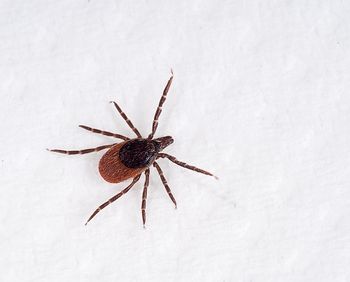
Essential oils are popular, but they could be a source of disease spread in health care settings.

Essential oils are popular, but they could be a source of disease spread in health care settings.

Hair levels are found to be the strongest independent predictor of virologic success in a recent treatment trial.

At CROI 2018, Dr. Patricia Flynn discussed the impact of ART on individuals with perinatal HIV infections, and how far the infectious disease community has come since its initial use.

Raltegravir-intensified therapy resulted in significantly faster viral load declines in HIV-infected adults and older children but did not reduce overall mortality or WHO 3/4 events compared with standard triple-drug ART.

In the wake of Europe’s recent 4-fold increase in measles cases, countries such as Italy, Germany, and Romania are passing tougher laws requiring vaccinations for children being enrolled in school.

A recent study finds that outbreaks of Valley fever have a wider geographic distribution than previously thought.

Mental health is a critical component of ending the HIV epidemic.

In case you missed them, we’ve compiled a list of the latest recalls posted this week.

Stay up-to-date on the latest infectious disease news by checking out our top 5 articles of the week.

At CROI 2018, Dr. Linda-Gail Bekker highlighted 7 controversies surrounding PrEP and provided conference attendees with enough evidence to separate fact from fiction.

The medical community has learned many lessons by looking back on the early days of the HIV/AIDS epidemic, including the value of multidisciplinary teams, the vital role of acute care clinicians, and more.

The Antibacterial Resistance Leadership Group (ARLG) is working to enroll patients in clinical trials of 2 investigational monoclonal antibodies, with the ultimate goal of reducing antimicrobial resistance.

Interim results of the HOPE study reveal that the vaginal ring reduced women’s risk of acquiring HIV by more than 50%. Women in this study are also using the ring more than in previous studies.

One study takes a look at how out-of-pocket costs impede the use of pre-exposure prophylaxis in young men who have sex with men.

Dr. Meg Watson from the CDC reports updated information regarding the current rates and trends of HIV diagnoses in the South at 2018 CROI.

At CROI 2018, Dr. Helen Weiss highlighted where we are in terms of meeting these goals, where the challenges are, and strategies to help prevent new infections.

Flu activity is down for the second week in a row in the United States, but as the flu season still has several weeks to go, the FDA has issued a warning about counterfeit flu medications.

New research from Australia supports the use of booster doses of the pneumococcal conjugate vaccine, but it shows overall effectiveness is high.

In an oral abstract session at CROI 2018, Dr. Nathan Thielman stresses that understanding the interest of HIV-positive treatment-experienced individuals in new antiretroviral therapies may help inform their development and uptake.

These landmark results are from a field study assessing the safety and efficacy of combination therapy with delamanid and bedaquiline in the treatment of drug-resistant tuberculosis.

Better understanding of the vaginal microbiome may provide new insights into HIV acquisition.

At CROI 2018, the World Health Organization released updated guidelines for cryptococcal disease in HIV-infected adults.

For use as donor screening tests on samples from individual human donors, the tests will identify antibodies to Babesia microti in human plasma samples and B. microti DNA in human whole blood samples.

Study results revealed that dolutegravir appears to be effective and well-tolerated in HIV/tuberculosis (TB) co-infected adults also receiving rifampin-based TB therapy.

First detailed analysis by race and risk group finds that two-thirds of those who could benefit from PrEP are African American or Latino, but they account for the smallest percentage of prescriptions to date.

Week 48 safety results show that switching to B/F/TAF was noninferior to remaining on DTG/ABC/3TC.

Better understanding of the pathogenesis of tuberculosis can help inform the development of a new, effective vaccine.

The World Health Organization reports that declining vaccination rates caused a 4-fold increase in measles cases in Europe last year, which prompted European health ministers to convene a meeting to discuss efforts to eliminate the virus.

Week 24 safety and efficacy data on women who switched from a baseline regimen (SBR) to B/F/TAF were presented at CROI 2018.

More research is needed but characterizing the biologic risk factors associated with HIV that are specific to transgender women may be key to informing more effective preventive strategies.